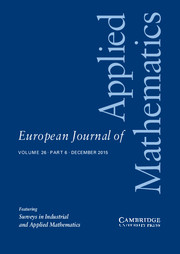No CrossRef data available.
Article contents
Thirteen years in the cockpit
Published online by Cambridge University Press: 17 March 2003
Abstract
It is a great pleasure for me to be asked to write this valedictory message to mark the end of my founding editorship of the European Journal of Applied Mathematics. I am tempted to follow in the discursive footsteps of one of the great founding editors, G. K. Batchelor, of the Journal of Fluid Mechanics fame. However, in accordance with our abiding efforts to keep EJAM crisp and concise, I will simply give you an ‘executive summary’ of my thoughts on what makes an applied mathematics journal successful:
There must be an integration of different styles. Applied mathematics means different things to different people around the world, and it is all too easy for one part of the culture to ignore another on the grounds of being too theoretical, too numerical or too practical. Editors must try to break down these barriers, none more than the board of EJAM, where we have always tried to give equal weight to theory and application. But even (or especially?) within Europe, this balance sometimes appears as hard to achieve as agreement about the euro.
All submissions must be read carefully by at least one editor, in addition to the referees. This is the surest way of minimizing the chances of mistaken rejection (or acceptance) and it is often vital when issues of ‘style’ arise. The reading can be painful for all concerned and I will long remember the following splendid riposte from an anguished author “I see you have eaten the referee's poisoned worm: bon appetit!”.
Along with the personal touch, there must be just the right degree of continuity with which authors can readily identify. Any editorial board striving to promote a particular intellectual policy will invariably have a degree of commonality of interests, and hence a continuity of theme. But this brings the danger of tunnel vision. To balance this, there is a need for a regular and imaginative turnover of board members, and this is an activity with which Cambridge University Press has been most helpful over the years.
Last, but by no means least, is the mandatory requirement that there be an understanding and unfailingly cheerful editorial assistant. This is another respect in which CUP's enlightened attitude has benefited several of their journals, and our authors and editors alike have strong reasons to be thankful to Angela Howard. We are delighted that she will stay on for a few years at least.
- Type
- Research Article
- Information
- Copyright
- 2003 Cambridge University Press


